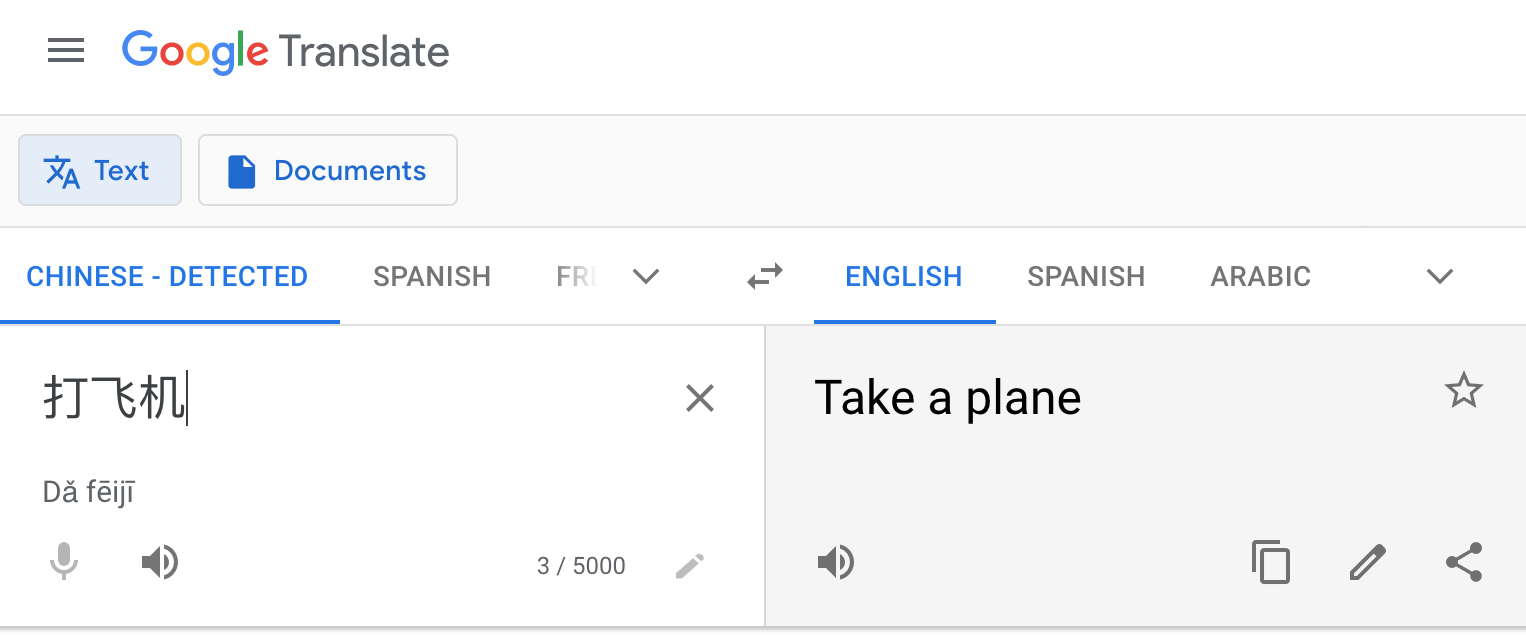"Hit the airplane" and Google Translate
« previous post | next post »
Charles Belov writes:
In response to a tweet by How Wee Ng:
During speaking class today, students practised describing different modes of transport, including taking a taxi dǎchē 打车, taking a plane zuò fēijī 坐飞机. But someone almost said "He took the plane to Beijing" using dǎ 打+ fēijī 飞机. I immediately intercepted, "No, you can’t go to Beijing that way."
I checked Google Translate and it responded "Take a plane".
I've submitted the correct translation "masturbate", but it will take more than one person submitting it to get the correction to happen.
Wiktionary has the correct translation, and it apparently has acquired a secondary meaning in Cantonese ("to do something solely for the feel-good feeling"), according to that entry, to my surprise.
To understand what's going on here, let's review what we know about the verb dǎ 打, which has more meanings than you can shake a stick at. "Dǎ 打" is what I'm fond of referring to as a "multipurpose verb" in Mandarin. Here are some of its meanings: "hit; strike; beat; thrash; spank; flagellate; lambast(e); fight; attack; make; build; break; smash; wipe; shoot; buy; calculate; fetch; tie up; board [a conveyance]; type[write]; [telephone] call; give [a call-out]" (never mind that it can also be a multipurpose noun or preposition).
You can say "dǎchē 打车" ("take a taxi"), but you can no longer say "dǎ fēijī 打飞机" in polite company to mean "take a plane", because this expression has been co-opted by the meaning "beat the airplane", i.e., "masturbate".
If you want to say "take a plane", avoid "dǎ fēijī 打飞机". Instead, use "chéngzuò fēijī 乘坐飞机" or "zuò fēijī 坐飞机" or "chéng fēijī 乘飞机". You can also say "dā fēijī 搭飞机", with a verb that means "take; build; put up; travel by; join; go by; put over; hang over; throw in more; contact; add; lift together", but it sounds too much like "dǎ fēijī 打飞机", so I would not speak "dā fēijī 搭飞机", though I would not hesitate to write it.
In appropriate circumstances, one can say "shàng fēijī 上飞机" ("board a plane").
Even though, as of this morning, "dǎ fēijī 打飞机" is still on Google Translate with the meaning "take a plane", for the record, here's the obligatory screen shot:
Selected reading
- "East Asian multilingual pop culture" (10/31/17) — "dǎ call 打call" ("give a shout-out")
- "Chinese Communist Party biscriptalism" (2/11/18)
- "Playing a small abacus" (3/26/19)

Calvin said,
December 11, 2020 @ 12:12 am
This is a conflation of two different colloquial terms from two different regional topolects (Hong Kong Cantonese vs. Mainland Mandarin).
打飞机 originated from Hong Kong (pre 1970 at least) as a slang for "guy pleasuring himself", and mostly confined there. Whereas 打车 is mostly used in Mainland China starting in the 1980-90 when taxi was becoming popular. It was likely started in Guangzhou with 打的 (shorten from 打的士 "call a taxi").
In fact, 打 means more like "call" or "get", instead of "take". So for transportation one won't say 打火车 ("get a train") or 打船 ("get a boat"), instead of 搭火车 ("take a train") or 搭船 ("take a boat").
Finally, Google Translate likely won't take "masturbate" for 打飞机 in common Chinese translation. That would be akin to merging Urban Dictionary into OED or Merriam-Webster.
Calvin said,
December 11, 2020 @ 12:21 am
I should mention couple somewhat similar examples in English language:
– Ask a Brit about "Shag Dance"
– Ask an Aussie about "Fanny Pack"
Twill said,
December 11, 2020 @ 2:04 am
@Calvin Both the OED and MW contain common colloquial terms for masturbation nowadays, so I don't really see the comparison. The "Urban Dictionary" seems to mostly contain crude in-jokes invented by a teenager for the amusement of them and a handful of their peers whereas most Mandarin speakers are aware what 打飞机 means. A competent translation service would at least in some way note where phrases are apt to cause mirth and/or offense, but I'll believe we're anywhere close to that with internet ones when we stop periodically seeing 干 catastrophically mistranslated.
John Swindle said,
December 11, 2020 @ 3:50 am
If "打飞机" is a common colloquial term for masturbation, "masturbate" isn't necessarily the right translation. As Calvin has suggested, the colloquial terms in English vary between regions (and within regions too).
IMarvinTPA said,
December 11, 2020 @ 7:57 am
So, this word is the Chinese equivalent of "smurf"?
https://tvtropes.org/pmwiki/pmwiki.php/Main/Smurfing
E. N. Anderson said,
December 11, 2020 @ 3:06 pm
Da feikei in Cantonese; current at least by 1965 when I learned it.
Calvin said,
December 11, 2020 @ 7:57 pm
@E. N. Anderson In 1965, a short distance from Hong Kong, a military handbook "How to Hit Airplane" (怎样打飞机) was published by the Guangzhou Military Region Command (https://zh.wikipedia.org/zh-hans/%E6%80%8E%E6%A8%A3%E6%89%93%E9%A3%9B%E6%A9%9F).
That was also the year after the first round of character simplification in PRC, a few characters on the cover were still in traditional form.
Chas Belov said,
December 11, 2020 @ 9:28 pm
Thank you! As always, there is more to learn about these matters.
Chas Belov said,
December 11, 2020 @ 9:41 pm
@Calvin – Additionally, I don't see the point of removing well-known slang from translation dictionaries; it would be good to advise people of secondary meanings so they don't inadvertently use them. (So long as one does not randomly choose them, of course.)
KevinM said,
December 12, 2020 @ 2:06 pm
So hit the airplane, and don't you come back no more, no more, no more, no more.
Chas Belov said,
December 13, 2020 @ 12:35 am
Confirmed OED includes the slang term "wank". (Can't link as the link is specific to my library.)